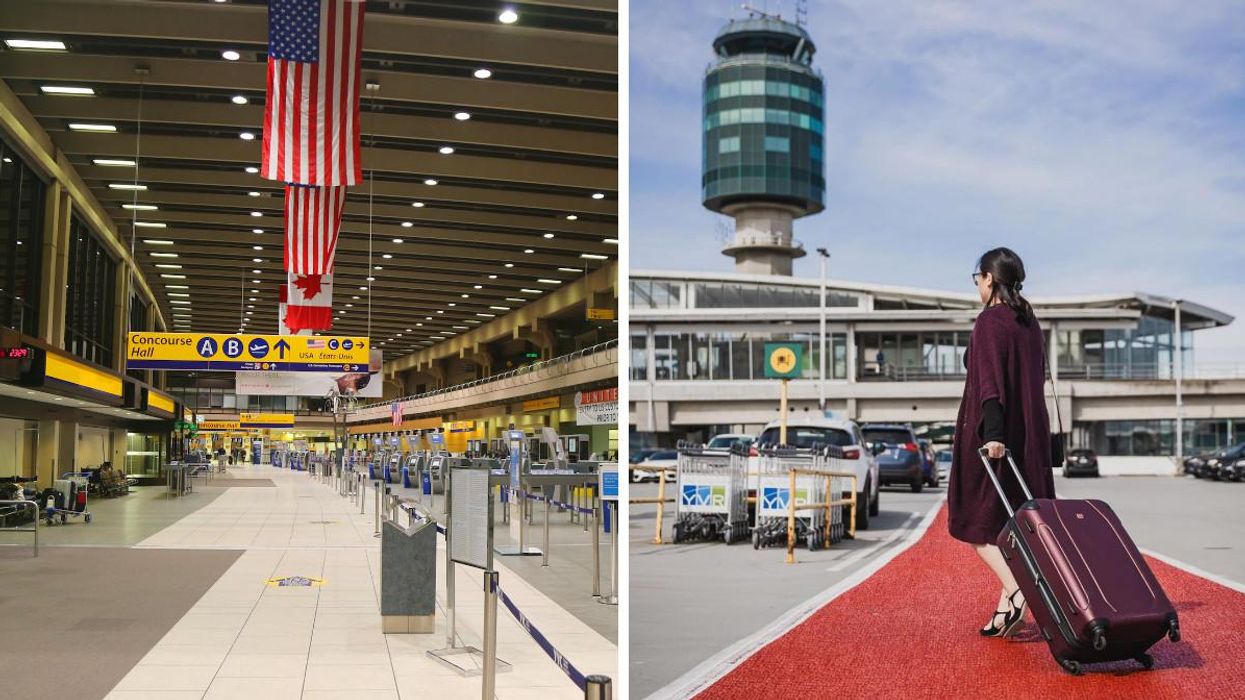Canada's Travel Restrictions Got A Major Update Today & Here's What You Should Know
Fully vaxxed travellers from abroad can return to Canada for non-essential reasons. ✈️
Perhaps the biggest update to Canada's travel restrictions so far has come into effect as of Tuesday, September 7.
Fully vaccinated travellers from across the world (with just a few exceptions) will be welcomed back into the country for non-essential purposes, including tourism, sightseeing and visiting friends and family.
With major changes just around the corner, here's everything you need to know.
International visitors are back
The biggest change set to take place on Tuesday is that all fully vaccinated international visitors will be permitted to return to Canada for discretionary purposes.
This includes things like travel, tourism, shopping and visiting friends and family, among other things.
Previously, Canada's land and air borders were closed to all travellers from abroad who did not have an essential reason for visiting.
On August 9, fully vaccinated American citizens and permanent residents residing in the United States were given the go-ahead to return to Canada (although this has yet to be reciprocated for Canadians).
COVID-19 vaccines are mandatory to skip restrictions
In order to enter Canada for a discretionary purpose and skip mandatory quarantine, all international visitors must have received the full course of a Health Canada-approved COVID-19 vaccine at least 14 days before travelling.
All travellers must also have proof of a negative pre-arrival COVID-19 test result taken no more than 72 hours before landing in Canada.
Travellers who've already had COVID-19 and recovered can provide proof of a positive COVID-19 test result instead, taken between 14 and 180 days before departure to Canada.
All passengers are required to submit their details via the ArriveCAN app or website, including proof of vaccination and a backup quarantine plan (in case they're required to quarantine unexpectedly.)
A border testing surveillance program is in place
Since August 9, fully vaccinated travellers entering Canada have not been required to take a COVID-19 test upon arrival unless they are randomly selected.
This border testing surveillance program will remain in place as of September 7.
"All travellers who are randomly selected for the border testing surveillance program must complete the mandatory arrival test; however, they do not have to quarantine while awaiting the result," reads a notice from the Government of Canada.
Anybody who refuses to be randomly tested by border officials may face fines.
What hasn't changed?
While fully vaccinated passengers from almost all countries will be permitted to enter Canada as of September 7, there are some exceptions.
Canada has suspended all direct commercial and private passenger flights from both India (until at least September 21) and Morocco (until at least September 29).
Passengers arriving in Canada via either country must get a valid pre-departure COVID-19 test result from a third country – other than India or Morocco.
There are no planned changes to Canada's restrictions and mandatory testing requirements for unvaccinated people, either.
This means unvaccinated travellers are still subject to quarantine and COVID-19 testing pre-arrival, on day one and on day eight. All personal details and travel information must continue to be submitted via ArriveCAN.
Can Canadians travel abroad now?
While international flights from Canada are beginning to resume and travel health insurance is available to those who want to go abroad, the government's official advice has not changed.
The feds continue to advise Canadians to avoid all non-essential travel outside of the country, as it says "international travel increases your risk of exposure to COVID-19 and its variants, as well as of spreading it to others."
- 6 Things To Remember When Travelling Through A Canadian Airport ›
- Canada's Travel Restrictions Are Changing But Travel Advice Isn't ... ›
- Canada’s Travel Restrictions Will Officially Stay In Place Until At Least November 21 - Narcity ›
- The Feds Are Urging Canadians To Avoid Travelling Abroad Right Now & Here’s Why - Narcity ›
- Canada's Travel Restrictions Were Updated & Here's What You Need To Know - Narcity ›
- I Just Flew From Toronto To California & Here's How COVID Restrictions Compare - Narcity ›
- Canada's International Border: Rules Set To Be Eased In September - Narcity ›
